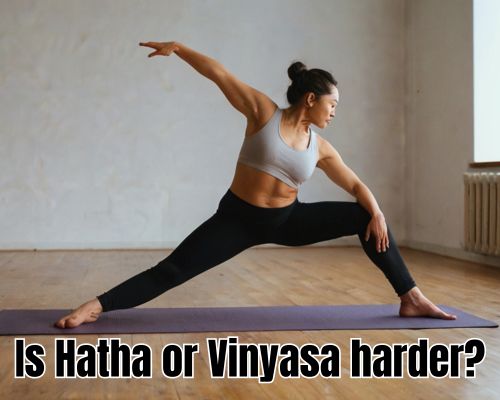Yoga isn’t just a workout; it’s a journey of body, mind, and spirit. For those in Mornington, Australia, choosing between Hatha and Vinyasa yoga classes can feel like picking your favorite beach — both beautiful but wildly different experiences. The big question? Is Hatha or Vinyasa harder? With Bikram Yoga Mornington, let’s break down the key differences, challenges, and what you can expect from each style in the local context of Mornington’s vibrant yoga scene.

Understanding Hatha and Vinyasa: Foundations and Flow
What is Hatha Yoga?
Hatha yoga is the grandparent of modern yoga styles — steady, deliberate, and accessible. It focuses on holding poses (asanas) longer, emphasizing breath control (pranayama) and alignment. Hatha classes in Mornington often appeal to beginners or those looking to deepen their mindfulness and flexibility without a race against time.
What is Vinyasa Yoga?
Vinyasa means “flow,” and flow it does. Vinyasa yoga links breath to movement in a dynamic sequence, creating a dance-like rhythm on the mat. It’s often more vigorous and cardio-intensive, attracting those who want a sweaty, energetic workout paired with yoga’s spiritual benefits. Mornington’s beaches and open spaces inspire many local studios to offer outdoor Vinyasa sessions, adding an extra challenge with nature’s elements.
Comparing Difficulty: Hatha vs Vinyasa
Physical Intensity
Vinyasa tends to be physically harder because it involves continuous movement. Think of it as a yoga cardio workout. Transitioning swiftly between poses requires strength, stamina, and coordination. In contrast, Hatha is slower-paced, giving you time to master poses and focus on technique. For those new to yoga or with limited mobility, Hatha is generally more approachable.
Mental Focus and Breath Control
Both styles demand mental discipline but in different ways. Hatha’s slower tempo invites deep concentration on breath and alignment, encouraging practitioners to hold challenging poses longer, sometimes testing patience and mental endurance. Vinyasa’s fast pace requires sharp focus to coordinate breath and movement fluidly, making it mentally taxing in a different, more dynamic way.
Flexibility and Balance
Vinyasa often includes complex sequences like arm balances and backbends executed quickly, demanding advanced flexibility and balance. Hatha allows more time to gradually increase flexibility and stability through prolonged holds and simpler poses. Mornington’s local instructors often tailor classes to the community’s average flexibility levels, gradually advancing difficulty in both styles.
Salient Entities and Local Flavor: Yoga in Mornington
Mornington, nestled on Victoria’s stunning Mornington Peninsula, boasts a rich wellness culture infused with seaside calm and vibrant community spirit. Here’s why that matters:
- Local Studios & Teachers: Mornington is home to acclaimed studios like Bikram Yoga Mornington and Peninsula Yoga Studio, offering both Hatha and Vinyasa with expert teachers who personalize the intensity to suit all skill levels.
- Outdoor Classes: The temperate climate and beautiful coastal parks make outdoor yoga popular, adding natural resistance and distractions that can ramp up the challenge, especially for Vinyasa flow practitioners.
- Community Events: Mornington hosts wellness festivals and yoga retreats focusing on both Hatha and Vinyasa styles, offering locals a chance to explore the nuances of each in depth.
Which Style Is Harder for Mornington Yogis?
The answer: it depends. But let’s get granular.
Beginners in Mornington
If you’re new and want a gentle introduction that builds strength and calm, Hatha is less intimidating. The slow pace lets you align your body properly, develop breath awareness, and cultivate a sustainable practice.
Fitness Seekers and Experienced Yogis
If you thrive on a sweat session that builds cardiovascular endurance, muscular strength, and quick reflexes, Vinyasa offers a more intense challenge. The flowing sequences test your stamina and coordination while keeping your mind engaged.
Personal Factors to Consider
- Age & Mobility: Older adults or those recovering from injury often find Hatha more manageable.
- Goals: Stress relief and flexibility? Hatha. Fitness and agility? Vinyasa.
- Local Conditions: Outdoor classes on windy or uneven terrain around Mornington’s beaches may feel harder for Vinyasa due to the flow and balance demands.
Expert Tips From Mornington Instructors
- Embrace Your Limits: Both styles invite progress, not perfection.
- Mix It Up: Many Mornington yogis blend Hatha and Vinyasa in their routines to balance challenge and restoration.
- Consistency Over Intensity: Regular practice, even if mild, beats sporadic extremes.
- Mind Your Breath: Breath control (pranayama) is a universal difficulty point but also the key to mastering both styles.
Wrapping Up: The Real Hardness Test
The question “Is Hatha or Vinyasa harder?” is a bit like asking whether a calm sea or a rolling wave is tougher to navigate — both offer unique challenges depending on your skills, goals, and environment. In Mornington, Australia, where yoga thrives both indoors and along the stunning coastline, the choice between Hatha and Vinyasa ultimately comes down to your personal rhythm.
Hatha yoga demands patience, mindfulness, and muscular endurance through stillness. Vinyasa challenges your cardio, coordination, and flow with dynamic movement. Both styles enrich your yoga journey — so why not try both and let your Mornington practice evolve organically?
Pro Tips for Mornington Yogis:
- Check out local Mornington studios offering trial classes.
- Consider outdoor classes at Mornington Park or along Main Street’s yoga hubs for a nature boost.
- Connect with the yoga community via Mornington Peninsula wellness events.
- Use yoga as a complement to hiking and beach activities common in Mornington for holistic health.
So, is Hatha or Vinyasa harder? It depends on your body, mind, and vibe — especially when practicing in a gorgeous place like Mornington. Dive in, flow, or hold steady — your yoga journey awaits on the Mornington Peninsula. 🙄